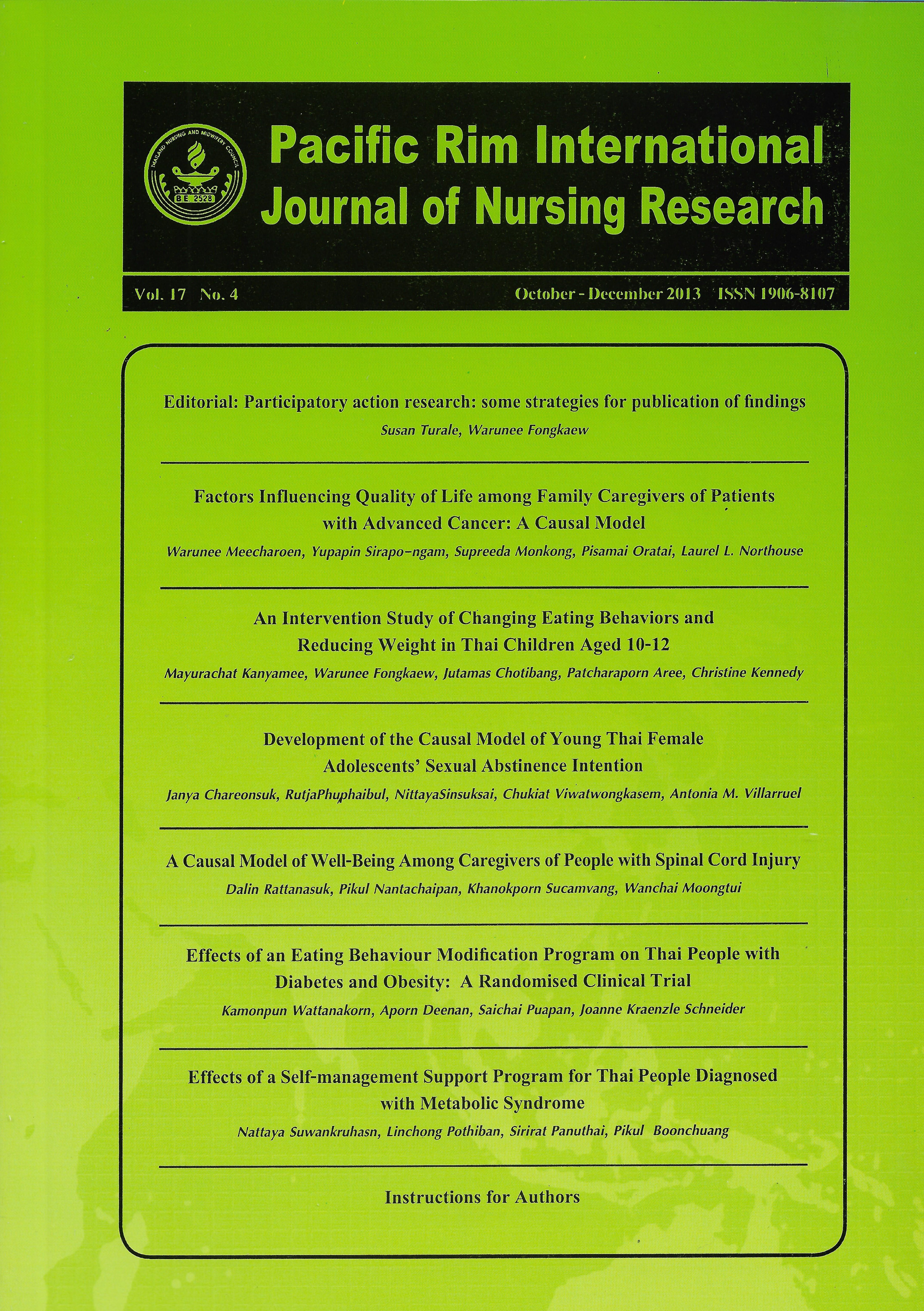A Causal Model of Well-Being Among Caregivers of People with Spinal Cord Injury
Keywords:
caregiver well-being, caregivers, spinal cord injury, causal modelAbstract
The act of caregivingfor people with spinal cord injury at home can result in decreased caregiver well-being which directly affects their quality of caregiving. The purpose of this cross-sectional descriptive study was to develop and evaluate a causal model which illustrates the relationship among the rewards of caregiving, social support, caregiving hours, functional ability of people with spinal cord injury, caregiving burden, and the well-being of caregivers. This study used comprehensive empirical evidence from a literature review as the conceptual framework. A sample of 205 caregivers of people with spinal cord injury was recruited via five hospitals in Thailandwhere such people received treatment.Instruments used for data collection included the Demographic Questionnaire, the World Health Organization-Five Well-being Index, the Rewards of Caregiving Scale, the Social Support Questionnaire, the Barthel Index, and the Caregiving Burden Scale. Data were analyzed via path analysis using the Maximum Likelihood technique in the LISREL program.
Results revealed that caregiving hours did not significantly affect the well-being of caregivers. The rewards of caregiving, social support and caregiving burden had a direct effect on well-being of caregivers. The rewards of caregiving, social support and functional ability of people with spinal cord injury had an indirect effect on well-being of caregivers through caregiving burden.These fourpredictors in the Model of Well-Being among Caregivers of People with Spinal Cord Injury explained 31% of total variance in the well-being of caregivers. These findings can guide nurses and health care providers to develop appropriate interventions to promote the well-being of Thai caregivers.
บทคัดย่อ : การดูแลผู้ป่วยบาดเจ็บไขสันหลังที่บ้านส่งผลให้ความผาสุกของผู้ดูแลลดลง ซึ่งมีต่อคุณภาพการให้การดูแลแก่ผู้ป่วยในทางลบได้การศึกษาภาคตัดขวางเชิงบรรยายในครั้งนี้มีวัตถุประสงค์เพื่อพัฒนาและทดสอบแบบจำลองเชิงสาเหตุระหว่าง รางวัลจากการดูแล การสนับสนุนทางสังคม จำนวนชั่วโมงที่ให้การดูแล ความสามารถในการทำกิจวัตรประจำวันของผู้ที่บาดเจ็บไขสันหลังและภาระการดูแล ต่อความผาสุกของผู้ดูแล โดยใช้การประมวลความรู้จากหลักฐานเชิงประจักษ์ของวรรณกรรมงานวิจัยในอดีตเป็นกรอบแนวคิดในการศึกษากลุ่มตัวอย่างในการศึกษาครั้งนี้ประกอบด้วยผู้ดูแลและผู้ที่บาดเจ็บไขสันหลังจำนวน 205 รายที่เคยเข้ารับการรักษาในโรงพยาบาล 5 แห่งในประเทศไทยแบบสอบถามที่ใช้เก็บรวบรวมข้อมูลได้แก่ แบบสอบถามข้อมูลส่วนบุคคลของผู้ดูแลและผู้ที่บาดเจ็บไขสันหลัง ดรรชนีชี้วัดความผาสุกขององค์การอนามัยโลก แบบสอบถามรางวัลจากการดูแล แบบสอบถามการสนับสนุนทางสังคม แบบสอบถามความสามารถในการประกอบกิจวัตรประจำวันของผู้ที่บาดเจ็บไขสันหลัง และแบบสอบถามภาระในการดูแลทดสอบรูปแบบสมมติฐานด้วยโปรแกรมลิสเรลโดยวิธีความน่าจะเป็นสูงสุด
ผลการศึกษาพบว่าจำนวนชั่วโมงที่ให้การดูแลไม่สามารถทำนายความผาสุกของผู้ดูแลได้อย่างมีนัยสำคัญทางสถิติพบว่ารางวัลจากการดูแล การสนับสนุนทางสังคม และ ภาระการดูแลมีอิทธิพลโดยตรงต่อความผาสุกของผู้ดูแลรางวัลจากการดูแล การสนับสนุนทางสังคม และ ความสามารถในการทำกิจวัตรประจำวันของผู้ที่บาดเจ็บไขสันหลังมีอิทธิพลโดยอ้อมต่อความผาสุกของผู้ดูแลผ่านภาระการดูแลปัจจัยทั้งสี่ร่วมกันทำนายความแปรปรวนในความผาสุกของผู้ดูแลได้ร้อยละ 31 ผลการศึกษาครั้งนี้ช่วยให้พยาบาลและบุคลากรทางสุขภาพนำไปพัฒนากิจกรรมพยาบาลที่เหมาะสมในการส่งเสริมความผาสุกของผู้ดูแลไทยต่อไป
Downloads
Published
How to Cite
Issue
Section
License
Copyright: The Pacific Rim International Journal of Nursing Research, Thailand Nursing & Midwifery Council has exclusive rights to publish, reproduce and distribute the manuscript and all contents therein.








.png)



